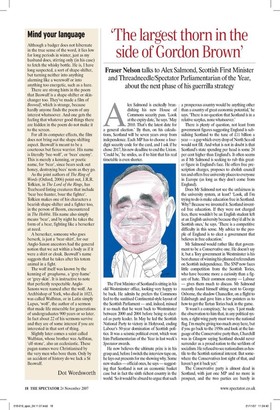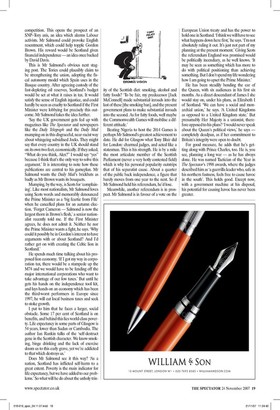'The largest thorn in the side of Gordon Brown'
Fraser Nelson talks to Alex Salmond, Scottish First Minister and Threadneedle/Spectator Parliamentarian of the Year, about the next phase of his guerrilla strategy Alex Salmond is excitedly brandishing his new House of Commons security pass. 'Look at the expiry date,' he says. 'May 2010. That's the latest date for a general election.' By then, on his calculations, Scotland will be seven years away from independence. Each MP has to choose a fourdigit security code for the card, and I ask if he chose 2017, his new deadline to end the Union. 'Could be,' he smiles, as if to hint that his real timetable is even shorter.
The First Minister of Scotland is sitting in his old Westminster office, looking very happy to be back. He admits he prefers the Commons feel to the sanitised Continental-style layout of the Scottish Parliament — and, indeed, missed it so much that he went back to Westminster between 2000 and 2004 before being re-elected as party leader. In May he led the Scottish National Party to victory in Holyrood, ending Labour's 50-year domination of Scottish politics. It was a seismic political event, which won him Parliamentarian of the Year in last week's Spectator awards.
He now believes the ultimate prize is in his grasp and, before I switch the interview tape on, he lays out presents for me showing why. Some new studies — official ones, he says — suggesting that Scotland is not an economic basket case but in fact the sixth richest country in the world. `So it would be absurd to argue that such a prosperous country would be anything other than a country of great economic potential,' he says. 'There is no question that Scotland is in a relative surplus, none whatsoever.'
There is plenty of question, not least from government figures suggesting England is subsidising Scotland to the tune of billion a year — a gap which every drop of North Sea oil would not fill. And what is not in doubt is that Scotland's state spending per head is some 24 per cent higher than England's It often seems as if Mr Salmond is seeking to rub this greater figure in England's face. He offers free prescription charges, proposes to abolish council tax and offers free university places to everyone in Europe (as long as they don't come from England) Does Mr Salmond not see the unfairness in the university system, at least? 'Look, all I'm trying to do is make education free in Scotland. Why? Because we invented it. Scotland invented free education. If they were not charged fees, there wouldn't be an English student left at an English university because they'd all be in Scottish ones,' he says. 'There is a competitive difficulty in this sense. My advice to the people of England is to elect a government that believes in free education.'
Mr Salmond would rather like that government to be a Conservative one. He doesn't say it, but a Tory government in Westminster is his best chance of winning his planned referendum on Scottish independence. The SNP now faces little competition from the Scottish Tories, who have become more a curiosity than a figure of hate. Their common enemy — Labour — gives them much to discuss. Mr Salmond recently found himself sitting next to George Osborne, the shadow Chancellor, on a flight to Edinburgh and gave him a few pointers as to how to get the Tartan Tories back in the game.
'It wasn't a conspiracy,' he says. 'I just made the observation to him that, in any political system, a right-wing party must wave the national flag. I'm maybe giving too much away here, but if you go back to the 1950s and look at the language of the Conservative party then, Churchill was in Glasgow saying Scotland should never surrender as a proud nation to the serfdom of socialism. He refused to see nationalism as hostile to the Scottish national interest. But somewhere the Conservatives lost sight of that, and haven't got it back yet.'
The Conservative party is almost dead in Scotland, with just one MP and no more in prospect, and the two parties are barely in competition. This opens the prospect of an SNP–Tory axis, an idea which alarms Labour activists. Mr Salmond could provoke English resentment, which could help topple Gordon Brown. His reward would be Scotland given financial independence — an idea once backed by David Davis.
This is Mr Salmond's obvious next staging post. The Tories could plausibly claim to be strengthening the union, adopting the fiscal autonomy model which Spain uses in the Basque country. After agreeing custody of the fast-depleting oil reserves, Scotland's budget would be set at what it raises in tax. It would satisfy the sense of English injustice, and could hardly be seen as cruelty to Scotland if the First Minister were lobbying for precisely this outcome. Mr Salmond takes the idea further.
'Say the UK government gets fed up with magazines like The Spectator and newspapers like the Daily Telegraph and the Daily Mail mumping on in this disgraceful, near-racist way about whingeing subsidised Jocks. They might say that every country in the UK should stand on its own two feet, economically. If they asked, "What do you think, Alex?" I would say "yes" because I think that's the only way to solve this argument.' It is interesting to note how these publications are central to his gameplan. Mr Salmond wants the Daily Mail's brickbats as badly as Mr Brown wants its bouquets.
Mumping, by the way, is Scots for 'complaining'. Like most nationalists, Mr Salmond loves using Scots words and memorably denounced the Prime Minister as a 'big feartie from Fife' when he cancelled plans for an autumn election. 'Forget Cameron — Salmond is now the largest thorn in Brown's flesh,' a senior nationalist recently told me. If the First Minister agrees, he does not admit it. Neither he nor the Prime Minister wants a fight, he says. 'Why could it possibly be in Gordon's interest to have arguments with or about Scotland? And I'd rather get on with creating the Celtic lion in Scotland.'
He spends much time talking about his proposed lion economy. 'If I got my way in corporation tax, there would be a stampede up the M74 and we would have to be fending off the major international corporations who want to take advantage of our low taxes.' But until he gets his hands on the independence tool kit, and lays hands on an economy which has been the third-worst performers in Europe since 1997, he will cut local business taxes and seek to stoke growth.
I put to him that he faces a larger, social obstacle. Some 17 per cent of Scotland is on benefits, and behind this lies world-class poverty. Life expectancy in some parts of Glasgow is 54 years, lower than Sudan or Cambodia. The author Ian Rankin talks of the 'self-destruct gene in the Scottish character. We know smoking, binge drinking and the lack of exercise doom us to this early grave, yet we're addicted to that which destroys us.'
Does Mr Salmond see it this way? 'As a nation, Scotland has inflicted self-harm to a great extent. Poverty is the main indicator for life expectancy, but we have added to our problems.' So what will he do about the unholy trinity of the Scottish diet: smoking, alcohol and fatty foods? 'To be fair, my predecessor [Jack McConnell] made substantial inroads into the last of these [the smoking ban], and the present government plans to make substantial inroads into the second. As for fatty foods, well maybe the Commonwealth Games will mobilise a different attitude.'
Beating Nigeria to host the 2014 Games is perhaps Mr Salmond's greatest achievement to date. He did for Glasgow what Tony Blair did for London: charmed judges, and acted like a statesman. This is his strength. He is by a mile the most articulate member of the Scottish Parliament (never a very hotly contested field) which is why his personal popularity outstrips that of his separatist cause. About a quarter of the public back independence, a figure that barely moves from one year to the next. So if Mr Salmond held his referendum, he'd lose.
Meanwhile, another referendum is in prospect. Mr Salmond is in favour of a vote on the European Union treaty and has the power to hold one in Scotland. 'I thinkwe will have to see what happens down here first,' he says. 'I'm not absolutely ruling it out. It's just not part of my planning at the present moment.' Giving Scots the referendum England was promised would be politically incendiary, as he well knows. 'It may be seen as something which has more to do with political positioning than achieving something. But I don't spend my life wondering howl am going to upset the Prime Minister.'
He has been steadily bending the ear of the Queen, with six audiences in his first six months. As a direct descendant of James I she would stay on, under his plans, as Elizabeth I of Scotland. 'We can have a social and monarchial union,' he says. 'A United Kingdoms as opposed to a United Kingdom state.' But presumably Her Majesty is a unionist, therefore opposed to his plans? 'I would never speak about the Queen's political views,' he says — completely deadpan, as if her commitment to Britain's integrity were open to doubt.
For good measure, he adds that he's getting along with Prince Charles, too. He is, you see, planning a long war — as he has always done. He was named Tactician of the Year in The Spectator's 1998 awards, where the judges described him as 'a guerrilla leader who, safe in his northern fastness, feels free to cause havoc in the south'. This holds good. Except now, with a government machine at his disposal, his potential for causing havoc has never been greater.







































































 Previous page
Previous page